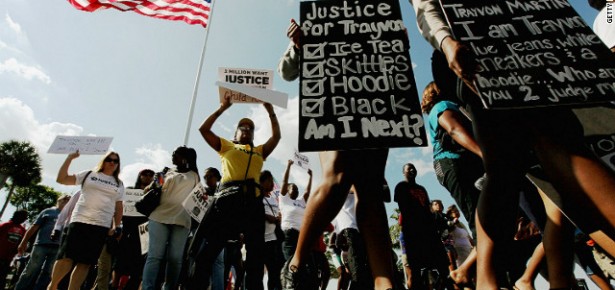
Trayvon Martin. The name resonates with tragedy. The tragedy resonates with dissent.
Americans may reasonably differ about the fairness of the verdict that exonerated George Zimmerman for killing a seventeen-year-old African-American high-school student. Where some see legal justice, others see racial injustice. Despite such differences, all should agree that conscientious Americans have a First Amendment right to engage in peaceful protest.
Were Zimmerman’s suspicions about Martin warranted? Was the defendant’s use of deadly force justified? Was the Sanford police department’s handling of the case adequate? Did the prosecutors, Angela Corey and Bernie De La Rionda, present as convincing a case as they might have? How problematic was it that the jury had only six members instead of the traditional twelve? Has the Trayvon Martin incident demonstrated the irresponsibility of statutes such as Florida’s stand-your-ground law? All of these questions are surely debatable.
What is beyond debate is the proposition that disgruntled law-abiding citizens can, and perhaps should, publicly register their dissent to what they perceive as failures of the legal system to secure equal justice. Such dissent may take the form of non-violent mass protest, lawful rallies and marches, peaceful picketing, or even individual leafleting and symbolic expressions of opposition. Activists from religious assemblies, civil rights organizations, political associations, and civic groups all may choose to raise their voices and march their feet in righteous condemnation.
In these regards, the government – federal, state, and local – must respect the exercise of First Amendment rights. By the same token, it must remain ideologically neutral concerning social protests. Equally important, politicians, media commentators, and social pundits must not equate constitutional dissent with mob rule. After all, the American system of free expression allows us to stir the pot in public issues touching upon the environment, abortion, same-sex marriage, health care, religious liberty, race relations, and so much more.
Despite the Supreme Court’s recent ruling on affirmative action and the Voting Rights Act, the debate over the lasting vestiges of racial bias ought not be silenced. This is not to deny the progress that has been made in this area, but to remind us that our work in racial equality is not yet done, and that we must be ever mindful of the race-based overtones in tragedies like that of Trayvor Martin’s untimely death.
If there is to be further salutary dialogue, it may take dissent to prime the pump. Dissent of the kind we espouse requires toleration on the one hand and responsibility on the other.
That is, the governmental targets of dissent must endure criticism, although they are equally free to respond in kind. And dissidents must take heed to honor the law and to strive to be reasonable in their reproach.
Such give-and-take invigorates our system of constitutional government. It is the means to secure minority rights against majority rule. It is the mirror that reflects our political and social failings. It is the valve that releases public pressure short of anarchistic violence. It is the mechanism by which individuals implement their conscience. It is the check on the excesses of governmental power. And it is the catalyst that prompts new visions of our world. And, above all, it is the American way.
We – the proud progeny of Thomas Paine, the dissident pamphleteer, and James Madison, the sage constitutionalist – should not shrink from actualizing the blessings of freedom. In so doing, we stand to turn an awful tragedy into a hopeful triumph.
Latest Comments
Have your say!